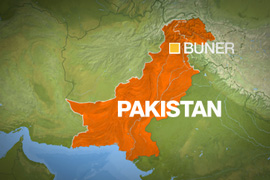Pakistan ‘abdicating to Taliban’
Clinton criticises Islamabad, as fighters move into country’s Buner district.

Asif Ali Zardari, Pakistan’s president, signed the deal into law earlier in April.
Later in her testimony, Clinton said that the US administration believes the Pakistani government shares Washington’s goal of fighting “terrorism”.
Taliban advance
Responding to Clinton’s comments, Yusuf Raza Gilani, Pakistan’s prime minister, said that the deal allowing sharia to be implemented in Swat was aimed at promoting peace in that region.
“Agreements are made so that both sides are bound by it. We have a minimum understanding that needs to be adhered to,” he said.
| In depth |
|
|
“Our agreement was that there will be peace in Swat and in return we would give them speedy justice. We have said we will take part in political dialogue with those who put down their weapons and the writ of the government. But if those agreements are broken then we reserve the right for other options as well.”
Earlier, Pakistani officials said that Taliban fighters in Swat had moved into a neighbouring district in what appeared to be a move to expand the region of its control, despite the Swat peace deal.
Hundreds of armed Taliban entered Buner district, only 110km from Islamabad, setting up checkpoints, occupying mosques and ransacking the offices of non-governmental organisations, a local official said.
“The Taliban who have arrived from Swat have increased patrolling, banned music in public transport and rampaged [through] the offices of NGOs and taken their vehicles,” Rashid Khan, a government official, said.
A Taliban commander said that they would set up sharia courts in Buner – as they have done in Swat – to end a “sense of deprivation”, but would not interfere with police work.
“We will soon establish our radio station. Our Qazis [Islamic judges] will also start holding courts in Buner soon,” Mohammad Khalil, a Taliban commander, said.
Muslim Khan, a spokesman for the Pakistani Taliban, speaking from Swat, denied that the government was being challenged in Buner saying that the Taliban was not creating “any hurdle in the administration’s work”.
Residents ‘scared’
But several residents said they felt “scared” and planned to leave the Buner area, fearing similar violence to that in Swat.
 |
The development is likely to trigger further criticism of the government’s agreement with fighters in Swat.
In an interview published in the US newspaper USA Today, Nawaz Sharif, a former Pakistani prime minister, said: “They are now threatening to get out of Swat and take other areas into their custody. So we’ve got to avoid that situation.”
The Pakistani authorities lost control in Swat, a former ski resort and a major tourist attraction, after a two-year campaign by fighters to enforce the Taliban’s interpretation of Islamic law.
In its deal with the Taliban, the government allowed sharia courts in Malakand, a district of about three million people in North West Frontier Province that includes the Swat valley, in order to halt the unrest.
But the Taliban has yet to disarm and its fighters appear to be trying to expand their control.
Meanwhile, in neighbouring Dir district, a senior administration official was kidnapped by “unknown” people, according to another official.

 Video: ‘Talibanisation of Pakistan’
Video: ‘Talibanisation of Pakistan’